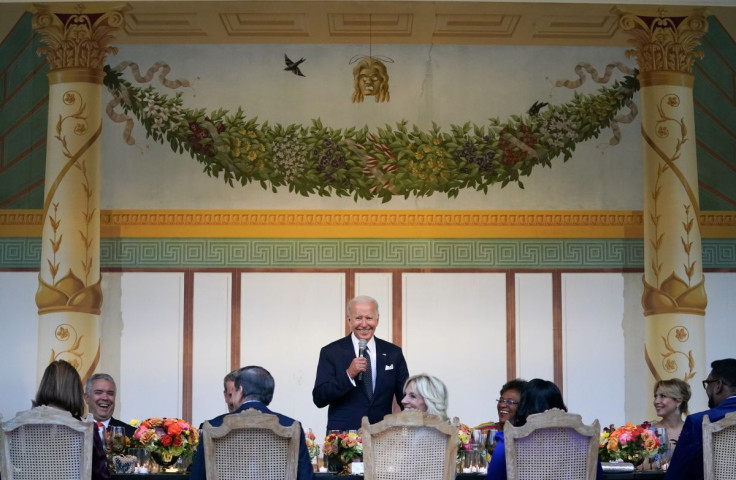Biden Unveils Migration Plan, Capping Americas Summit Roiled By Division

U.S. President Joe Biden and fellow leaders from the Western Hemisphere on Friday rolled out a new set of measures to confront the regional migration crisis, seeking to salvage an Americas summit roiled by division.
Biden's aides had touted the migration declaration as a centerpiece of the U.S.-hosted Summit of the Americas, and 20 countries joined him for a ceremonial unveiling of the plan - though several others stayed away.
Capping the summit's final day, the White House promoted a series of migrant https://www.whitehouse.gov/briefing-room/statements-releases/2022/06/10/los-angeles-declaration-on-migration-and-protection programs agreed by countries across the hemisphere and Spain, attending as an observer, which pledged a more cooperative approach. But analysts were skeptical that the pledges are meaningful enough to make a significant difference.
Those measures include the United States and Canada committing to take more guest laborers, providing pathways for people from poorer countries to work in richer ones, and other countries agreeing to greater protections for migrants. Mexico also will accept more Central American workers, according to a White House statement.
"We're transforming our approach to manage migration in the Americas," Biden said. "Each of us is signing up to commitments that recognizes the challenges we all share."
The flags of 20 countries, several fewer than the number attending the summit, festooned the stage where Biden led the rollout. But that number was only achieved after days of U.S. pressure.
It was another sign of tensions that have marred the summit, undermining Biden's efforts to reassert U.S. leadership and counter China's growing economic footprint in the region.
That message was clouded by a boycott by several leaders, including Mexico's president, to protest Washington's exclusion of leftist U.S. antagonists Cuba, Venezuela and Nicaragua. The line-up was thinned to 21 visiting heads of state and government.
The administration, facing a record flow of illegal migrants at its southern border, pledged hundreds of millions of dollars in aid for Venezuelan migrants, renewed processing of family-based visas for Cubans and Haitians and eased the hiring of Central American workers.
The announcements were part of the unveiling of U.S.-led pact dubbed the "Los Angeles Declaration" and aimed at spreading responsibility across the region to contain the migration problem.
The plan culminates a summit designed to re-establish U.S. influence among its southern neighbors after years of relative neglect under former President Donald Trump. Biden proposed an economic partnership to help the region's pandemic recovery - though it appears to be a work in progress.
But at the summit's opening on Thursday, leaders from Argentina and tiny Belize rebuked Biden over the guest list, underscoring the challenge the global superpower faces in restoring its status among poorer neighbors.
On Friday, Chile, Bolivia, the Bahamas, St. Lucia, Barbados and Antigua and Barbuda joined the criticism, though Biden was not present.
"No one should exclude another country," Mexican Foreign Minister Marcelo Ebrard, sitting in for President Andres Manuel Lopez Obrador, said from the podium.
The sessions this week regularly rang out to U.S. composer's John Philip Sousa's "The Liberty Bell" march, popularized by the classic British comedy show "Monty Python's Flying Circus."
'THERE'S NOTHING HERE'
U.S. officials scrambled until the last minute to persuade skeptical governments to back the plan.
The leaders vowed in the declaration "to strengthen national, regional and hemispheric efforts to create the conditions for safe, orderly, humane and regular migration."
Standing together with fellow leaders, Biden insisted "unlawful migration is not acceptable," and expressed hope that other countries would join the plan.
Eric Olson, director of policy at the Seattle International Foundation, called the declaration a "useful framework" but said it would likely have limited near-term effects because it is non-binding.
Some initiatives listed by the White House were announced previously. Biden's aides have cast the immigration plan in part to help ease U.S. labor shortages.
Jorge Castaneda, a former Mexican foreign minister, said pledges from the Americas should allow Washington to argue it had secured major commitments, a domestic "political plus" for Biden. But he added: "On substance, there's nothing here."
Mexico, whose border with the United States is the main point of migration - backed the declaration, despite Lopez Obrador's no-show.
The absence from the summit of leaders of Guatemala, Honduras and El Salvador - the Northern Triangle from which many migrants come - has raised doubts how effective the pledges will be. U.S. officials insisted the turnout did not prevent Washington from getting results.
The declaration encompasses commitments by an array of countries, including Mexico, Canada, Costa Rica, Belize and Ecuador. There was no mention, however, of pledges by Brazil, Latin America's most populous nation.
The announcement did not include any U.S. pledges for additional work visas for Mexicans. That would form part Lopez Obrador's visit with Biden next month, an official said.
Spain pledged to "double the number of labor pathways" for Hondurans, the White House said. Madrid's temporary work program enrolls 250 Hondurans, suggesting only a small increase is envisioned.
Curbing irregular migration is a priority for Biden. Republicans, seeking to regain control of Congress in November elections, have pilloried the Democratic president for reversing Republican Trump's restrictive immigration policies.
But migration has had to compete with Biden's other major challenges, including high inflation, mass shootings and the war in Ukraine.
© Copyright Thomson Reuters 2024. All rights reserved.





















